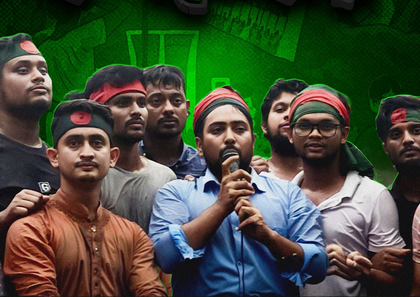Bangladesh faces rising political turmoil since ouster of former PM Hasina: Report
By IANS | Updated: November 11, 2025 21:05 IST2025-11-11T21:04:55+5:302025-11-11T21:05:14+5:30
Dhaka, Nov 11 Several rights groups have expressed serious concerns over ongoing abuses in Bangladesh under the Muhammad ...

Bangladesh faces rising political turmoil since ouster of former PM Hasina: Report
Dhaka, Nov 11 Several rights groups have expressed serious concerns over ongoing abuses in Bangladesh under the Muhammad Yunus-led interim government. The country has been gripped by political turmoil since former Prime Minister Sheikh Hasina was ousted in August 2024 following a mass student-led demonstration, a report said on Tuesday.
Citing a report from Dhaka-based rights organisation Odhikar, leading German media outlet Deutsche Welle (DW), stated that at least 281 people had been killed in political violence following the fall of the Awami League government.
The report recorded 40 victims of extrajudicial killings and 153 lynching incidents, with many deaths attributed to Bangladeshi security forces, including the police and the army.
“In its October report, the Manabadhikar Shongskriti Foundation (MSF), an NGO, also warned there was a rise in unidentified bodies and deaths in custody. The group reported that 66 unidentified bodies had been recovered nationwide in October alone, and 13 custodial deaths were reported during the same period,” the DW report detailed
Speaking to DW, Nur Khan, a member of the Bangladesh Commission of Inquiry on Enforced Disappearances, stated that the police efforts to investigate the rising number of deaths have been insufficient.
"It's not certain that all of them were murders. But some of them may have been extrajudicial killings. Mobs are now also responsible for extrajudicial killings in many cases," Khan argued.
Earlier in October, six international groups — including Human Rights Watch (HRW) and the international press watchdog, the Committee to Protect Journalists (CPJ) — wrote to Yunus, calling for stronger measures to stop human rights abuses.
"We are deeply concerned that the security sector remains largely unreformed and that members of security forces have not been fully cooperative with accountability and reform efforts," the letter stated.
Meenakshi Ganguly, HRW's Deputy Asia Director, told DW the interim government must work alongside "civil society, religious, and political parties" to ensure the Bangladeshis "trust the justice system" and curb angry protests and mob violence.
The Yunus administration has amended the 2009 Anti-Terrorism Act and used it to ban Hasina’s Awami League party. HRW criticised the amendments as "draconian,” with several journalists arrested under the act.
The report highlighted that journalist Monjurul Alam Panna and 15 others were arrested in August under the Anti-Terrorism Act for taking part in a roundtable on the country's 1971 independence war against Pakistan.
In a statement last month, Reporters sans frontieres’ (RSF) South Asia head Celia Mercier cited Monjurul Alam Panna’s detention as an example that "highlights the increasing authoritarianism of Bangladesh's interim government”, while accusing the Yunus-led interim government of using anti-terrorism laws "to silence critical voices."
Disclaimer: This post has been auto-published from an agency feed without any modifications to the text and has not been reviewed by an editor
Open in app